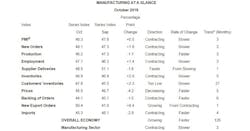Economic activity in the manufacturing sector contracted in October, and the overall economy grew for the 126th consecutive month, say the nation’s supply executives in the latest Manufacturing ISM Report On Business.
“Comments from the panel reflect an improvement from the prior month, but sentiment remains more cautious than optimistic,” said Timothy R Fiore, chair of the ISM Business Survey. “October was the third consecutive month of PMI contraction, at a slower rate compared to September. Demand contracted, with the New Orders Index contracting marginally, the Customers’ Inventories Index moving into ‘about right’ territory and the Backlog of Orders Index contracting for the sixth straight month (and at a faster rate). The New Export Orders Index surged into expansion territory, likely contributing to the slowing contraction of the New Orders Index.
“Consumption (measured by the Production and Employment indexes) contracted, due primarily to lack of demand, but contributed positively (a combined +0.3-percentage point increase) to the PMI calculation. Inputs—expressed as supplier deliveries, inventories and imports—were again lower in October, due primarily to supplier delivery contraction offset by improvements in inventories. This resulted in a combined 0.4-percentage point net improvement in the Supplier Deliveries and Inventories indexes.”
The October PMI registered 48.3%, an increase of 0.5 percentage point from the September reading of 47.8%.
Other highlights from the report:
- The New Orders Index registered 49.1%, compared to the September reading of 47.3%.
- The Production Index registered 46.2%, compared to the September reading of 47.3%.
- The Backlog of Orders Index registered 44.1%, compared to the September reading of 45.1%.
- The Employment Index registered 47.7%, compared to the September reading of 46.3%.
- The Supplier Deliveries Index registered 49.5%, compared to the September reading of 51.1%.
- The Inventories Index registered 48.9%, compared to the September reading of 46.9%.
- The Prices Index registered 45.5%, compared to the September reading of 49.7%.
- The New Export Orders Index registered 50.4%, compared to the September reading of 41%.
- The Imports Index registered 45.3%, compared to the September reading of 48.1%.
“Imports contraction quickened,” Fiore said. “Overall, inputs indicate (1) supply chains are meeting demand and (2) companies are more confident that materials received will be consumed in a reasonable time period. Prices decreased for the fifth consecutive month, at a faster rate.”
Primary metals was among 12 industries reporting contraction in October, along with transportation equipment, machinery, fabricated metal products and miscellaneous manufacturing.
“Global trade remains the most significant cross-industry issue,” Fiore said. “Food, Beverage & Tobacco Products remains the strongest industry sector and Transportation Equipment the weakest sector.
“Overall, sentiment this month remains cautious regarding near-term growth.”
Here are some selected comments from respondents:
- “Customer demand is down, and we are expecting a very soft fourth quarter, without much relief in sight for Q1. Suppliers report the continued rise in labor costs, which are ultimately reflected in the rising product costs.” (Computer & Electronic Products)
- “The chemical manufacturing industry is depressed; demand across many markets globally is down, and pricing is as a result.” (Chemical Products)
- “Automotive sales continue to decrease; however, trucks and SUVs are still providing decent revenue. Cautiously optimistic for the near term.” (Transportation Equipment)
- “Economy is showing slight signs of weakening. The same business headwinds on trade, tariffs, and currency uncertainty are making the environment challenging.” (Food, Beverage & Tobacco Products)
- “Been hearing from lots of my suppliers that their business is down and [they are] looking for more work in the metal processing [and] machining areas. We remain very busy.” (Fabricated Metal Products)
- “Production demand is softening; some [of it is] due to seasonality, [but] much [is] due to customer order rate declining and dealer inventory stabilizing.” (Machinery)
- “Business for thermoplastic resins is very strong, but margins continue to be under pressure due to tariffs and global economy uncertainty.” (Plastics & Rubber Products)
- “Trade cost pressures continue to be a headwind in our business.” (Paper Products)
- “Automotive related manufacturing is definitely slowing in the US. I think we are seeing the negative impacts of the tariff war with China and the unsigned [US-Mexico-Canada Agreement] deal starting to hurt consumer confidence, especially on large purchases. Corporations are slowing orders/production accordingly.” (Primary Metals)
- “Our business levels have softened over the last three to five months, in the US market [and] globally. Germany and China are both experiencing similar slowdowns. We are in the industrial industry, and the outlook appears to remain soft into Q1 of 2020.” (Electrical Equipment, Appliances & Components)
